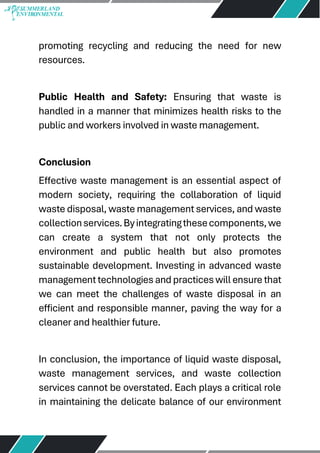The 9-Minute Rule for Reclaim Waste
The 9-Minute Rule for Reclaim Waste
Blog Article
More About Reclaim Waste
Table of ContentsExcitement About Reclaim WasteReclaim Waste - An OverviewReclaim Waste Fundamentals ExplainedSome Known Incorrect Statements About Reclaim Waste Some Of Reclaim Waste
Domestic sewer waste refers to the waste and items from a property septic tank. The appropriate management and disposal of domestic sewer waste require fluid waste to be moved to a sewer treatment plant where the correct methods and devices are used to detoxify and dispose of waste.
Commercial waste usually includes prospective threats, such as flammable materials or a combination of liquid and solid waste products, and needs an advanced and detailed disposal process. The disposal of commercial waste normally involves the purification of waste prior to transportation to ensure safe and correct disposal. Industrial waste is created from byproducts and overflow of industrial processes and manufacturing.
This kind of waste can not use the same sewage administration transport or processes as septic or industrial liquids. The hazardous waste management process needs the inspection and screening of fluid waste prior to it undertakes the disposal procedure (liquid waste removal). Overflow waste is the liquid waste that comes from overflow and excess stormwater in extremely inhabited areas or cities
Runoff waste can create contamination and flooding if not taken care of effectively. Ensuring correct waste administration can avoid calamities and minimize environmental injury.
A Biased View of Reclaim Waste
Get in touch with PROS Providers today to learn more about our waste management and disposal services and the appropriate ways to take care of the fluid waste you produce.
(https://reclaim-waste.jimdosite.com/)Do you know what takes place to your water when you pull the plug, flush the bathroom or drain the cleaning device? No? Well, it's worth understanding. This so-called 'wastewater' is not just an important resource yet, after therapy, will be released to our land, waterways or the sea. Used water from commodes, showers, baths, cooking area sinks, washings and industrial procedures is known as wastewater.

water utilized to cool down equipment or clean plant and tools). Stormwater, a form of wastewater, is overflow that moves from agricultural and city areas such as roofing systems, parks, yards, roadways, courses and gutters into stormwater drains pipes, after rain. Stormwater moves unattended directly to regional creeks or rivers, at some point reaching the ocean.
Not known Incorrect Statements About Reclaim Waste
In Queensland, a lot of wastewater is dealt with at sewer treatment plants. Wastewater is transported from domestic or industrial sites through a system of sewers and pump stations, referred to as sewage reticulation, to a sewer therapy plant. City governments build, maintain and run most sewer therapy plants. Operators are accredited under the Environmental Security Act 1994 to release cured wastewater at an acceptable ecological requirement right into rivers.
The Department of Natural Resources recommends city governments about handling, operating and keeping sewerage systems and treatment plants. In unsewered areas, city governments might call for homeowners to set up specific or home sewer therapy systems to deal with residential wastewater from commodes, kitchen areas, bathrooms and washings. The Department of Natural Resources authorises using family systems when they are shown to be effective.
Most stormwater obtains no therapy. In some brand-new communities, treatment of some stormwater to remove clutter, sand and crushed rock has begun making use of gross contaminant traps. Wastewater treatment takes place in 4 phases: Removes solid issue. Larger solids, such helpful resources as plastics and various other items wrongly released to sewers, are removed when wastewater is gone through screens.
Utilizes little living organisms knows as micro-organisms to break down and remove remaining dissolved wastes and fine fragments. Micro-organisms and wastes are included in the sludge.
The Basic Principles Of Reclaim Waste
Nutrient removal is not available whatsoever sewage treatment plants because it needs costly specialized tools. It is ending up being a lot more usual in Queensland. Clear fluid effluent created after therapy may still include disease-causing micro-organisms. If this effluent is released into waterways such as rivers or the sea, the micro-organisms will eventually die out.

Many wastewater flows into the sewerage system. Under the Act, local governments provide approvals and licences for ecologically appropriate activities (Ages) including wastewater launches that might have a neighborhood impact.
Some Of Reclaim Waste
Or else, samples are taken for research laboratory evaluation. Often several examinations are required to establish the degrees of each of the different pollutants such as oils, heavy steels and chemicals in water. Tracking gives factual info regarding water quality and can verify that permit problems are being met. The information obtained through tracking supplies the basis for making water high quality choices.
Report this page